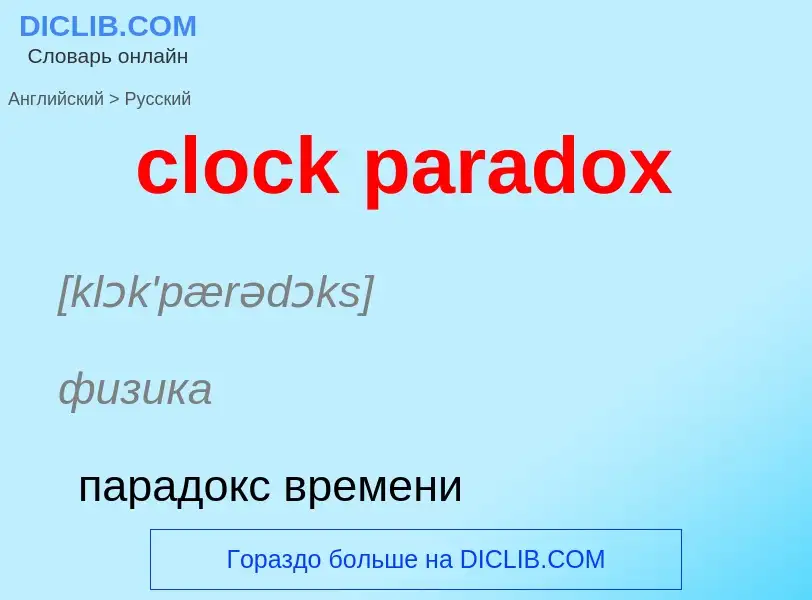Traducción y análisis de palabras por inteligencia artificial ChatGPT
En esta página puede obtener un análisis detallado de una palabra o frase, producido utilizando la mejor tecnología de inteligencia artificial hasta la fecha:
- cómo se usa la palabra
- frecuencia de uso
- se utiliza con más frecuencia en el habla oral o escrita
- opciones de traducción
- ejemplos de uso (varias frases con traducción)
- etimología
clock paradox - traducción al ruso
[klɔk'pærədɔks]
физика
парадокс времени
парадокс близнецов (в теории относительности)
математика
парадокс при голосовании
математика
парадокс лжеца
Definición
Wikipedia
In physics, the twin paradox is a thought experiment in special relativity involving identical twins, one of whom makes a journey into space in a high-speed rocket and returns home to find that the twin who remained on Earth has aged more. This result appears puzzling because each twin sees the other twin as moving, and so, as a consequence of an incorrect and naive application of time dilation and the principle of relativity, each should paradoxically find the other to have aged less. However, this scenario can be resolved within the standard framework of special relativity: the travelling twin's trajectory involves two different inertial frames, one for the outbound journey and one for the inbound journey. Another way of looking at it is to realize the travelling twin is undergoing acceleration, which makes him a non-inertial observer. In both views there is no symmetry between the spacetime paths of the twins. Therefore, the twin paradox is not actually a paradox in the sense of a logical contradiction.
Starting with Paul Langevin in 1911, there have been various explanations of this paradox. These explanations "can be grouped into those that focus on the effect of different standards of simultaneity in different frames, and those that designate the acceleration [experienced by the travelling twin] as the main reason". Max von Laue argued in 1913 that since the traveling twin must be in two separate inertial frames, one on the way out and another on the way back, this frame switch is the reason for the aging difference. Explanations put forth by Albert Einstein and Max Born invoked gravitational time dilation to explain the aging as a direct effect of acceleration. However, it has been proven that neither general relativity, nor even acceleration, are necessary to explain the effect, as the effect still applies if two astronauts pass each other at the turnaround point and synchronize their clocks at that point. Such observer can be thought of as a pair of observers, one travelling away from the starting point and another travelling toward it, passing by each other where the turnaround point would be. At this moment, the clock reading in the first observer is transferred to the second one, both maintaining constant speed, with both trip times being added at the end of their journey.



